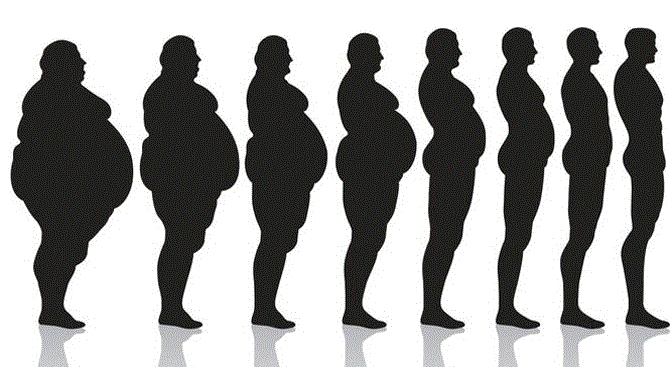Weight Loss

Not as easy as you might imagine
The key to weight loss is burn off more calories that you take in. Sounds simple, but there's a complicating factor.
The number of calories burnt off has two components:
- the calories consumed by physical activity,
- the calories burnt off just to sustain your body, the Basal Metabolic Rate, or as its commonly known as, your metabolism.
People with a fast metabolism can eat more food without gaining weight than a person with a slow metabolism can.
The complicating factor with weight loss is that your body is able to change the speed of your metabolism.
Flawed weight loss strategies
Many people try to starve off the fat. Initially they make progress and are pleased, but fairly soon the body slows down the metabolism to compensate and progress halts.
If the starvation has been too extreme, then the diet is not sustainable in the long-term, and people end up eating more. The trouble is, with a slower metabolism, even if they end up eating less than they originally did, they gain weight again. With a now damaged, more sluggish, metabolism, the new body weight is often more than it was originally! We call this the yo-yo effect.
Dieting makes you fat!
Common pitfalls and how to avoid them
- If you go more than 4 hours without putting food into your body, your metabolism changes, as if there is a food shortage, and consequently any surplus calories consumed are more readily stored as fat! So it is advisible to put food into your mouth every four hours, (of course, over the course of a day it is best to consume less calories than you were doing before starting your diet.
- To counteract the process whereby your body slows down your metabolism when on a low calorie diet, it is best to have a high calorie day once a week (and no more often than once a week).
What about low fat and low carbohydrate diets
Each kilogram of fat contains four times as many calories as a kilogram of carbohydrates or of a kilogram of protein. So the simple strategy of cutting out high fat content foods seems a good way to reduce your calorie intake.
Some people find that eating more carbohydrates (e.g. bread and potatoes) causes them to gain weight. Consequently some people have advocated the extreme strategy of having a low or zero carbohydrate diet and eating more fat. Taking things to the extreme is thought to be bad for your long-term health, but, if you are carbohydrate sensitive, reducing your intake seems a sound strategy to adopt if you're trying to lose weight.
Exercise
The other strategy to losing weight is to burn off more calories, which means doing more exercise.
There are two types of exercise, aerobic (exercises commonly known as cardio, or CV exercise, such as jogging, cycling etc.) and anaerobic (exercises commonly known as resistance exercises such as using machines with weights in a gym).
With aerobic exercises you burn off calories for all the time you're exercising. With anaerobic exercises you burn off calories all the time you are exercising and also each hour for approximately the following 24 hours.
Now one component of your metabolic rate is how much muscle you have. Increasing the amount of muscle you have speeds up your metabolism.
Adaptation
Your body does not want to lose weight. Whatever you do, your body will adapt to slow down your progress. The secret to success is staying one step ahead of this adaptation.
If you're dieting and exercising to lose weight it's a good idea to monitor your weight, the circumference of your girth (or skin-fold thickness, or use body component analysing scales), and if you find your progress is slowing down then change something. You may switch from doing one form of exercise to doing another form, you may switch from one diet to another one. If you keep monitoring your progress and find with your new strategy that progress eventually slows, you could switch strategy again (even back to your original strategy) and your progress should continue.
Recommended strategy
Taking account of all the processes described here, a logical strategy is to:
- Reduce the number of calories you eat over 24hrs by reducing portion sizes or the quantities of fat and starchy carbohydrates in the diet.
- To eat as soon as you wake up, (break the fast) and eat 6 small meals a day: breakfast, mid-morning snack, lunch, mid-afternoon snack, tea and supper.
- Once a week eat a "pre-diet" quantity of food (psychologically it can also he helpful to allow yourself, on one day of the week, to eat some of the foods you love but know you should not have if you're wanting to lose weight).
- Don't try to starve off the fat, try to burn it off by exercise.
- Do a combination of aerobic and anaerobic exercises.
- Speed up your metabolism by increasing your muscle mass (1lb of muscle weight MORE than 1lb of fat, and although you may lose body fat, you may end up weighing more (which is why it's helpful to use a tape measure as well as a set of weighing scales to monitor your progress. We say we're trying to lose weight, but in reality our goal is to lose body fat.)
- Monitor your progress regularly (say fortnightly) and if progress is slowing down, change something.
- Keep motivated. Some people find it easier to keep motivated if an outside person is involved, and so joining a weight loss group such as Weight watchers can by helpful.
The most enthusiastic people who want to lose weight might find the Burn the fat website helpful.




